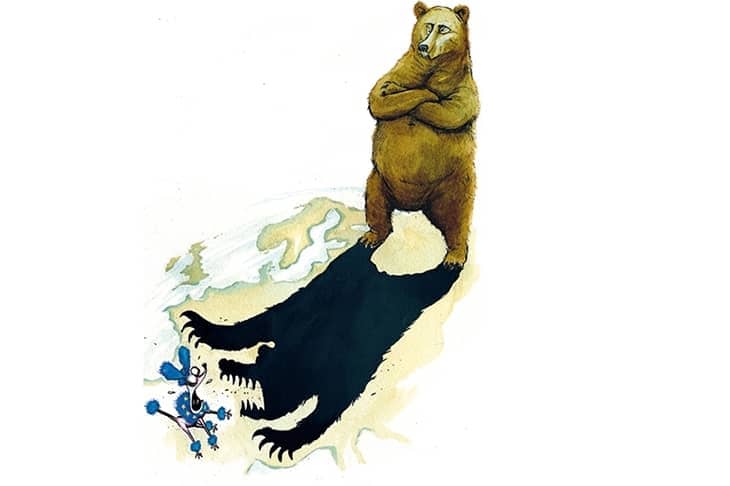Soft options
Sir: In relation to strengthening the impact of the Russian sanctions package (‘Tsar Vladimir’, 26 February), please may I suggest three enhancements? Firstly, to encourage the UK’s Dependencies, such as the British Virgin Islands, to enforce the UK’s sanctions on the government target list of Russian criminals who are operating within their corporate jurisdiction. Secondly, to define the Russian state, Putin and his cronies, as terrorists, much like the members of Islamic State. This is appropriate and proportional, and will enable institutions in the City, and elsewhere, to treat the Russians accordingly. And thirdly, to make the UK’s sanctions extra-territorial, much like the Bribery Act, which essentially enforces all UK based, not just domiciled, institutions to adhere to the sanctions legislation or lose their licence to operate in the UK. I believe what the UK lacks in hard power can be overcome with its soft power assets and a willingness to do the right thing for the Ukrainian nation.
Antony Edwards
Shillingstone, Dorset
Putin’s peril
Sir: Like many in the West, Timothy Garton Ash described Putin’s public address concerning the invasion of Ukraine as ‘unhinged’ (Diary, 26 February). This is fair comment, but we should not be surprised. Putin’s paranoid aggression is a product of Russia’s suffering from foreign aggressors: his parents endured the Nazi siege of Leningrad while his elder brother, Viktor, died of diphtheria. Even though Putin was born after these events, it is likely that any diminution of military influence close to Russian borders will be perceived as an existential threat. This is no apology for Putin’s behaviour but an attempt to emphasise the extreme peril he presents to the world.
Charles Jenkins
Penn, Buckinghamshire
Naked truth
Sir: Cosmo Landesman (‘Strip club’, 26 February) is correct about older men going nude, but wrong to attribute this to ‘something dark’. With age and maturity one realises that bodies come in all shapes and sizes and the old Adam/Eve myth about ‘naked and ashamed’ fades away. Incidentally across all cultures women are more deeply inculcated with the belief that nakedness is shameful which is why they find it harder to shed inhibitions. Underlying this, however, is the unwelcome fact that with age the sight of another naked body arouses less interest than in youth.
Alan Cameron.
Ipswich
Sausage roles
Sir: I enjoyed James Innes-Smith’s article about dachshunds (‘Notes on…’ 26 February), although Lump, the canine star of Picasso’s variations on Velázquez’s ‘Las Meninas’, was only a lodger in the artist’s house near Cannes. In fact, he belonged to David Douglas Duncan, the celebrated American war photographer, whom he accompanied on a visit from Germany in 1957. Lump immediately decided that being adored by Picasso was better than being bullied by Duncan’s Afghan hound, and so he stayed for seven years. When he was diagnosed with a back problem (common to the breed) and given days to live, Duncan drove him back to Germany and a vet more versed in such matters. Lump lived with him for another ten years.
I have two miniature wire-haireds, Mitzi and Heidi, who similarly rule the roost. I suggest a loud bell attached to the collar if you have a hunter. Many is the time Heidi has disappeared into a thicket after a rabbit and would seem lost were it not for the tinkle of the bell. It both cuts down the time taken to extract her and gives the rabbits a sporting chance.
Caroline Donald
Author of Dachshunds: the Long and the Short of Them
Hadspen, Somerset
Stones unturned
Sir: Christopher Howse notes that ‘the ever-present sun’ and ‘the absence of writing’ are two dominant elements in the British Museum’s The World of Stonehenge exhibition (‘Everything under the sun’, 19 February). The exquisitely crafted objects he describes surprise the modern eye by their artistry and challenge us to find their ritualistic meaning: they certainly render the images of woad-painted savages living in pit-dwellings painted to me by my grandpa laughable. It’s true too that without written records Stonehenge will forever retain its enigmatic appeal. Robert Newall, who excavated there in the 1920s – examining displays and interpretation of his findings in Salisbury Museum, where I was curator 50 years later, then in his nineties and with a twinkle in his eye – gently pointed out that the museum’s hypotheses about Stonehenge would not be the last. He would have been as ‘bowled over’ by the latest discoveries setting Stonehenge in context as Howse.
Peter Saunders
Salisbury, Wiltshire
Christ’s wine list
Sir: Apropos Ysenda Maxtone Graham’s article on communion bread and wine (‘Grapes of wrath’, 12 February), I was very surprised 12 years ago at Easter communion at a Presbyterian church in Los Angeles to be told by the priest that the bread was the normal boring wafer but they had a very nice Burgundy for the blood of Christ or, if you preferred white, a Beaujolais from Napa Valley as an alternative. I chose the white as a unique opportunity.
Peter Brown
London W2
Wales of sorrow
Sir: Britain, your leader says, is the first country to draw a line under the pandemic (26 February). Sadly not. England is. Wales remains masked, with other rules also in place. We pray for enlightenment to come to our esteemed First Minister soon.
Christopher Heneghan
Abergavenny






Comments